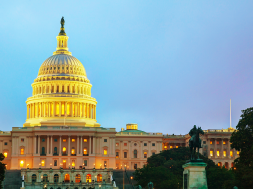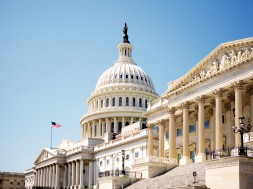
CECU Sends List of Priorities and Policy Recommendations to President-Elect Biden
January 11, 2021
The Honorable Joseph R. Biden
President-Elect
United States of America
1401 Constitution Avenue, NW
Washington, DC 20230
The Honorable Kamala D. Harris
Vice President-Elect
United States of America
1401 Constitution Avenue, NW
Washington, DC 20230
Dear President-Elect Biden and Vice President-Elect Harris:
On behalf of the 600 members of Career Education Colleges and Universities (“CECU”), thank you for the Transition Team’s invitation to offer our priorities and policy recommendations for the incoming U.S. Department of Education (“ED”). We appreciate the opportunity to meet with ED Agency Review Team members on December 16, 2020 and hope to continue a constructive dialogue with your administration in the months and years ahead.
We share many of the same goals as the President-Elect, including expanding access for those who wish to pursue postsecondary education, maximizing student outcomes, ensuring a return on educational investment, and rebuilding the economy through job training and career education opportunities targeted toward high-demand professions. We also support accountability and transparency across all sectors of higher education.
To this end, we strongly encourage the incoming leaders at ED to fully utilize the data available through the College Scorecard and other sources that allow for a fair and unbiased assessment of all postsecondary institutions in all sectors regardless of tax status. When evaluating these data, it is evident that there are high- and low-performing institutions and educational programs in every sector of higher education. We hope that in seeking ways to identify and hold accountable low- performing programs, ED leaders will follow the data wherever it leads.
The President-Elect has repeatedly said he supports a policy of student loan forgiveness for a portion of the debt carried by many Americans who have accessed Title IV, HEA funds to pay for their educations. The widespread support such a policy enjoys among the public and policy makers is an acknowledgment that there exists across all sectors of higher education a problem of low-income borrowers struggling with unmanageable student loan debt, unable to find suitable work in their chosen field of study.1 As ED leaders consider any new or revised accountability-related regulations, we encourage you to take a comprehensive view of all higher education programs and institutions, as unmanageable student debt has repeatedly been identified as a problem across all sectors.
To be clear, we do not oppose the idea of regulations designed to hold institutions and programs accountable for their students’ graduation and employment outcomes. We simply ask that the same rules apply to all Title IV institutions and programs across all sectors. Data is readily available that allow for a fair comparison, so we see no reason not to apply the same standards equitably and fairly to all institutions and all educational programs.
The need to use available data to look at all institutions and programs is even more relevant today than it was a decade ago, as the lines of ownership and tax status are quickly becoming blurred in higher education. Large public universities have created and are aggressively marketing to students using entirely online education platforms, including more than one that has acquired a large for-profit entity to facilitate the transition. Likewise, several large non-profit online institutions have been established. Regardless of tax status, many of these entities engage in similar marketing, student recruitment, and business practices, leading to similar student outcomes.2 They should all be evaluated together and held accountable to the same standards.
Relatedly, any regulations comparing outcomes at postsecondary institutions and programs should consider the differences between 2-year or less career education programs and 4-year online liberal arts programs. Too often, proponents of Gainful Employment-style regulations mix the two together in discussing student outcomes, ignoring the fact that the institutions have different missions and serve different student populations. The 4-year online schools should be compared to one another, regardless of tax status. Likewise, outcomes at 2-year career-oriented programs should be assessed evenly across all sectors, allowing for an apples-to-apples comparison that considers student demographics and socioeconomic status.
Below, we offer additional proposals we respectfully request be considered by ED during the new administration:
- Actively engage stakeholders across all sectors when developing significant regulations, guidance documents, and interpretations to ensure the regulated community is provided the opportunity to provide meaningful input. Any public involvement in the development of regulations requiring negotiated rulemaking should include separate primary seats for both large and small private, proprietary institutions. This democratic process will result in better policies that will spark less opposition and controversy.
- Resist the urge to use underdeveloped or underused statutory authorities. Although there are calls to sidestep stakeholders by using ambiguous authorities in the HEA to condition an institution’s Title IV eligibility, we believe doing so would deprive ED and the regulated community of information and suggestions from a wide range of perspectives.
- Recognize any significant regulations and guidance should provide an appropriate comment and phase-in period for the regulated entity and should not include a look-back measurement that prevents remediation before imposing an adverse action.3
- Withdraw the provision in the June 17, 2020 Interim Final Rule (“IFR”) regarding the Eligibility of Students at Institutions of Higher Education for Funds Under the Coronavirus Aid, Relief, and Economic Security (“CARES”) Act.4 The justification for imposing Title IV student eligibility requirements to Higher Education Emergency Relief Fund (“HEERF”) emergency financial aid grants is erroneous and does not align with Congressional intent.
- Ensure any changes to the borrower defense to repayment process balance relief for borrowers and affords due process for institutions. This process should continue to allow both parties an opportunity to provide evidence and arguments and to review and respond to such evidence.
- Waive the financial responsibility standards at 34 CFR 668, Subpart L and the 90/10 revenue percentage requirement for a period of three years. We join many other associations concerned that the ongoing economic crisis and liquidity crunch caused by COVID-19 will impact the institutional financial responsibility composite scores and revenue from sources other than Title IV.
- Reassess whether the waivers and modifications issued on December 11, 2020 should be continued beyond their current expiration dates or expanded to provide additional regulatory relief to institutions and students.5 For example, extending to December 31, 2021 the maximum number of days in an approved leave of absence (in any 12-month period) due to COVID-19 is justified since many educational programs are unable to offer the clinical/practicum components because of state-imposed restrictions.
- Pursue a new negotiated rulemaking process to update the financial responsibility regulations. The existing financial responsibility standards are outdated and are an imprecise indicator of an institution’s financial health.
- Convene a Technical Review Panel to update the IPEDS functional expense categories (e.g., instructional spend and student services). More precise and consistent definitions on key functional areas across sectors will provide better insight into institutional priorities.
- Refrain from using inflammatory rhetoric or characterizing the entire postsecondary proprietary sector as “predatory”. Regardless of sector, each postsecondary institution should be independently judged on how well it serves its students and should not be unfairly lumped together with lower-performing schools because of shared tax status.
- Visit a proprietary institution. ED leaders are encouraged to visit (even virtually) a CECU member campus within the administration’s first 100 days to talk with students and faculty, observe the instructional environment, and gain a more thorough understanding of the issues of importance to proprietary institutions and their students. We are happy to facilitate scheduling this meeting with a campus in the Washington, DC metropolitan area or elsewhere in the country.
Thank you again for the opportunity to share with you our views on these important topics. Although we will surely have disagreements on some issues, we look forward to a constructive exchange of ideas throughout the process. Working together in good faith, we hope to help you craft a higher education agenda that ensures continued access to career education for students from all socioeconomic backgrounds while fairly measuring outcomes across all sectors, thereby holding all institutions and programs accountable for student outcomes.
Best wishes for a successful transition. We look forward to working with you and your team to strengthen America’s education and training beyond high school.
Sincerely,
Jason Altmire, DBA President and CEO
c: Linda Darling-Hammond, U.S. Department of Education Agency Review Team Lead Kenny Thompson, U.S. Department of Commerce Agency Review Team Member
References
- Forbes, Preston Cooper, Underemployment Persists Throughout College Graduates’ Careers, June 8, 2018, Available at: https://www.forbes.com/sites/prestoncooper2/2018/06/08/underemployment-persists-throughout-college-graduates-careers/?sh=776c4d517490
- Inside Higher Ed, Lindsay McKenzie, University of Maryland University College will change name and spend big to grow national footprint, March 13, 2019, Available at: https://www.insidehighered.com/digital-learning/article/2019/03/13/university-maryland-university-college-will-change-name-and
- Any “significant regulatory action” under Executive Order 12866 should include a comment period of no less than 90 days to give the regulated community a meaningful opportunity to review and provide feedback.
- 85 Fed. Reg. 36,494
- 85 Fed. Reg. 79,856










